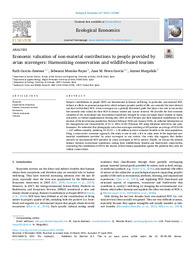Please use this identifier to cite or link to this item:
https://hdl.handle.net/11000/33897
Economic valuation of non-material contributions to people provided by avian scavengers: Harmonizing conservation and wildlife-based tourism
 View/Open: 21.pdf
View/Open: 21.pdf771,96 kB
Adobe PDF
Share:
Title:
Economic valuation of non-material contributions to people provided by avian scavengers: Harmonizing conservation and wildlife-based tourism |
Authors:
García-Jiménez, Ruth
Morales-Reyes, Zebensui
Pérez García, Juan M.
Margalida, Antoni  |
Editor:
Elsevier |
Department:
Departamentos de la UMH::Biología Aplicada |
Issue Date:
2021 |
URI:
https://hdl.handle.net/11000/33897 |
Abstract:
Nature's contributions to people (NCP) are fundamental to human well-being. In particular, non-material NCP,
defined as effects on personal perspectives which enhance people's quality of life, are currently the most abstract
and least well-defined NCP. Avian scavengers are a globally threatened guild that plays a key role in our society
but currently only valued for their NCP of disease control and carcass removal. We describe the first economic
valuation of the recreational and educational experiences brought by avian scavenger-based tourism in Spain,
concretely, at vulture supplementary feeding sites (SFS) in the Pyrenees and their important contribution to the
incomes of the local human population. Between February 2018 and January 2020, we collected information on
the management and characteristics of 53 (c. 80%) of the Pyrenean SFS using telephone interviews and questionnaires. We estimated that photography and avian scavenger-watching at SFS produce an average of US $4.90
± 2.67 million annually, including US $2.53 ± 1.36 million in direct economic benefits to the local population.
Using a conservative economic approach, this study is one of only a few to value some of the important nonmaterial contribution provided by avian scavengers to our society. Our study also suggests that further
research on non-material NCP provided by avian scavengers at SFS is needed. Finally, we discuss the delicate
balance between recreational experiences arising from wildlife-based tourism and biodiversity conservation,
contrasting the contribution of SFS to the income of local human populations against the problems they raise for
vulture conservation.
|
Keywords/Subjects:
Conservation economics
Cultural ecosystem services
Ecotourism
Vulture restaurant
Vultures |
Knowledge area:
CDU: Ciencias puras y naturales: Biología |
Type of document:
info:eu-repo/semantics/article |
Access rights:
info:eu-repo/semantics/openAccess
Attribution-NonCommercial-NoDerivatives 4.0 Internacional |
DOI:
https://doi.org/10.1016/j.ecolecon.2021.107088 |
Published in:
Ecological Economics, Volume 187, September 2021, 107088 |
Appears in Collections:
Artículos - Biología Aplicada
|
 ???jsp.display-item.text9???
???jsp.display-item.text9???